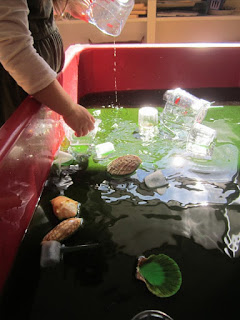I sometimes add liquid watercolor paint to the water in the
sensory table just to change the visual appearance, but also because the
colored water is easier for the children to see as they move it through clear
containers and tubes.
One morning, as I filled the sensory table, the eastern
light came in at a perfect angle and hit the water just so.
As the children played, the interaction of light and shadow
on the colored water added a new dimension to their play. They moved containers
and objects back and forth, between the light and the dark, observing changes
in appearance.
Some children noticed the light reflected from the water in
the table onto the ceiling, and watched as it moved across the ceiling during
the morning.
“Look at the light!” “I see it!” “The water is shining!” The
children can’t understand why the water is shining, or why the light shines in
some places but not others. In fact, they weren’t even curious about why. But
this simple moment of wonder in discovery, and opportunity to observe an event
that it happens, is as important in the scientific process as the theoretical
reasoning, predictions, and conclusions that will happen later.




No comments:
Post a Comment